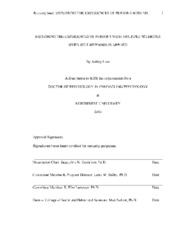| dc.description.abstract | Multiple Sclerosis (MS) is an unpredictable and generally debilitating disease for which there is no cure. Conventional treatments have significant side-effects and involve considerable risks. I conducted an interpretative phenomenological analysis with eight participants to identify the common themes in the experiences of persons living with MS, specifically: how this disease affects one's quality of life (QoL), what role pain plays in their lives, and what changes, if any, were experienced when the participants applied selfhypnosis. Most participants reported that their idea of QoL was fluid. All participants reported their QoL was shifted by MS, and some reported both positive and negative changes. Four main themes emerged in how these participants defined and measured their QoL: (a) connectivity with others, (b) level of functioning, (c) positivism and (d) hope. The unpredictability of the disease was addressed by all participants and reported by almost all to affect each of these four domains. Seven participants reported feeling daily physical pain and that pain had a profoundly negative and complex impact on their lives. Pain was found to be physically tormenting, mentally consuming, and emotionally inundating for these participants. The physical, mental and emotional constituents of pain can all have a drastic impact on one's existence, and the combination was reportedly devastating for some. After four weeks of self-hypnosis, the following changes were identified: (a) improved emotional regulation, (b) intrapersonal improvements (c) improved cognitive functioning, and (d) improved physiological state. No negative or adverse effects were reported by any of the seven participants who completed the study. Six participants reported positive changes in their journal entries. Six participants reported they were extremely likely to use hypnosis in the future and to recommend hypnosis to others. With an increased understanding of the complex impact that MS has on people, we can learn to better support, treat, and empower those with MS. QoL is subjective, yet invaluable. Based upon this initial case study inquiry, it is possible that self-hypnosis could be an effective and personalized tool for meeting the multifaceted needs of this population. | en |


 Maintained by the Northwest University Library
Maintained by the Northwest University Library